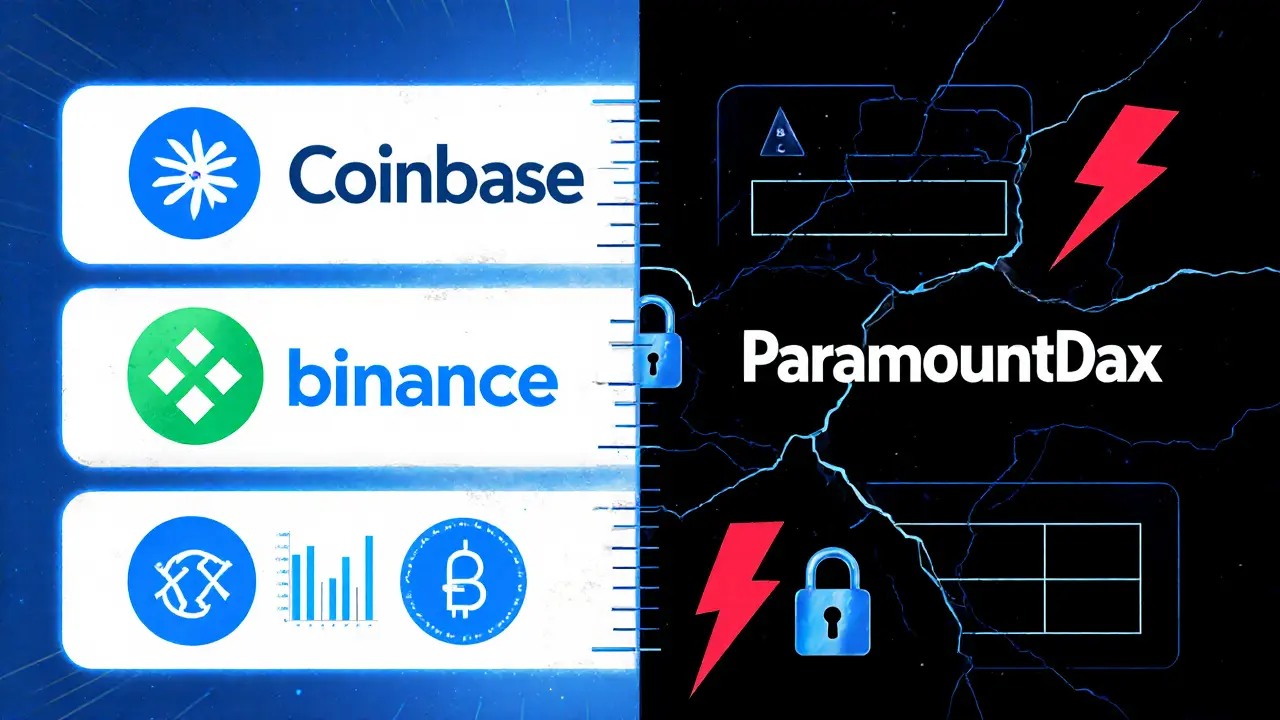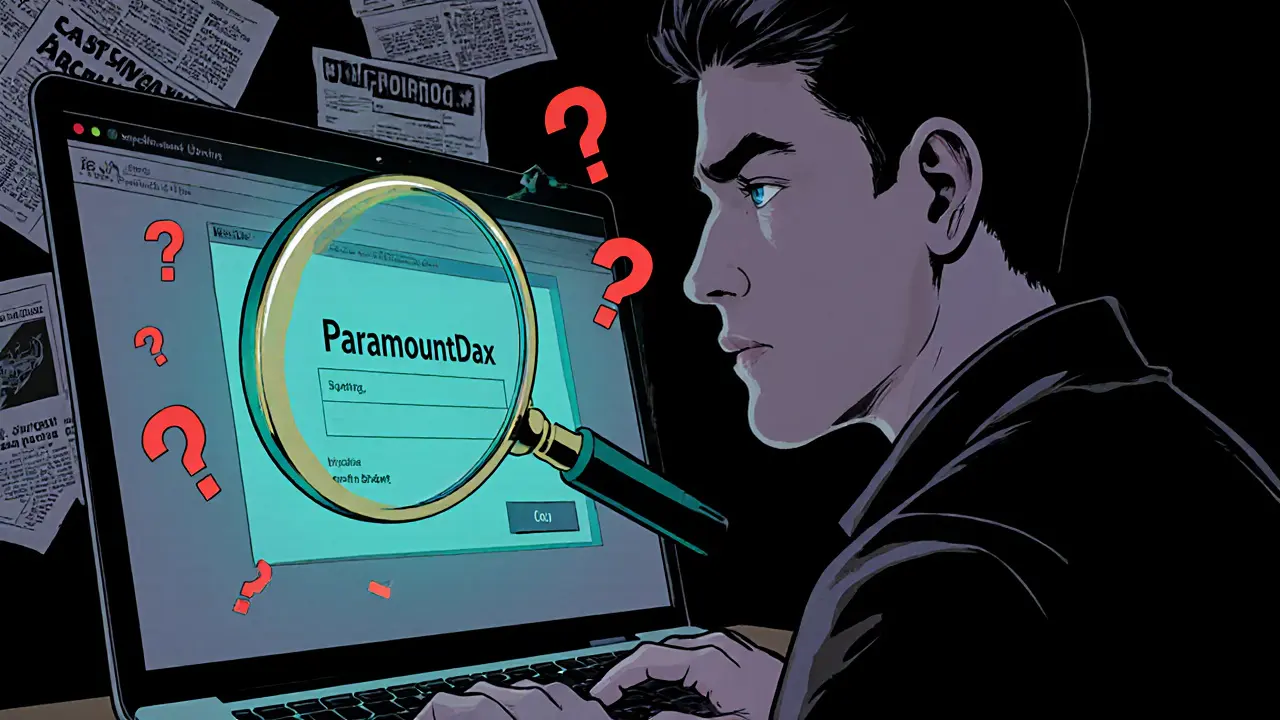ParamountDax Crypto Exchange Review: Is It Legit or a Scam?
Crypto Exchange Trustworthiness Checker
Verify Your Exchange's Trustworthiness
This tool evaluates exchanges against industry-standard trust criteria. Based on the article about ParamountDax, it checks for transparency in regulation, security, fees, and community feedback.
Enter exchange information and click "Check Trustworthiness" to evaluate the platform.
Key Takeaways
- ParamountDax has no verifiable public information, making it a high‑risk platform.
- Legitimate exchanges are transparent about regulation, fees, security, and trading volume.
- Use a checklist - licensing, insurance, audit reports, and community feedback - before depositing any funds.
- Established alternatives like Coinbase (a US‑based exchange regulated by the SEC and FinCEN) or Binance (the world’s largest crypto venue by volume, registered in the Cayman Islands) offer clear fee schedules and robust security.
- If you still want to explore ParamountDax, limit exposure to a few dollars and keep funds in a personal wallet.
When you type “ParamountDax crypto exchange review” into Google, you expect a deep dive: fees, security, supported coins, and real‑user experiences. The reality is far messier - there’s virtually no public data on ParamountDax. That absence alone is a warning sign. In this article we’ll unpack what we do (and don’t) know, compare the platform against industry standards, and give you a practical checklist to decide whether to trust it with your money.
What Is ParamountDax?
ParamountDax is purportedly a cryptocurrency exchange that claims to let users trade Bitcoin, Ethereum, and a handful of altcoins. Beyond that claim, there are no verifiable corporate records, no listed licensing authority, and no independent security audits publicly available. The name does not appear in any regulatory database (FinCEN, AUSTRAC, FCA) and is missing from reputable comparison sites that track hundreds of exchanges worldwide.

How Legitimate Crypto Exchanges Prove Their Trustworthiness
Before you hand over any crypto, ask the platform for proof of the following:
- Regulatory licensing. Look for registration numbers with bodies such as the US Securities and Exchange Commission (SEC), the UK Financial Conduct Authority (FCA), or Australia’s AUSTRAC.
- Security certifications. Independent audits (e.g., SOC2, ISO27001) and proof of cold‑storage percentages.
- Transparent fee schedule. Clear percentages for maker/taker fees, withdrawal fees, and any hidden costs.
- Trading volume data. Medium to high 24‑hour volume indicates liquidity; most exchanges publish this on their dashboard or on sites like CoinMarketCap.
- Customer support channels. Live chat, email tickets, and a reputation‑based help center.
- Community feedback. Reviews on Trustpilot, Reddit, and crypto forums give insight into real‑world performance.
If an exchange can’t point to a single item on this list, treat it like a shady online store.
Side‑by‑Side Comparison with Established Exchanges
| Exchange | Regulation | 24‑hr Volume (USD) | Fee Structure | Security Measures |
|---|---|---|---|---|
| Coinbase | SEC, FinCEN, FCA (UK) | ~$1.2B | 0.5% maker, 0.5% taker | Insurance on hot wallets, SOC2, 98% cold storage |
| Binance | Cayman Islands, some licences in EU | ~$12B | 0.10% maker, 0.10% taker (discounts with BNB) | SAFU fund, 2‑FA, cold storage >95% |
| Kraken | FinCEN, FCA (UK) | ~$300M | 0.16% maker, 0.26% taker | Proof‑of‑reserves, 94% cold storage |
| Gemini | NYDFS, FCA (UK) | ~$150M | 0.25% maker, 0.35% taker | FDIC‑insured custodial accounts, 99% cold storage |
| Crypto.com | FinCEN, FCA (UK) | ~$200M | 0.04% maker, 0.10% taker (with CRO) | Hardware‑wallet integration, 95% cold storage |
| ParamountDax | None publicly listed | Unknown | Not disclosed | No audit reports, cold‑storage claim unknown |
Red Flags Specific to ParamountDax
Here are the warning signs that stand out when you search for ParamountDax:
- No official website. A legitimate exchange always has a domain that resolves to a professionally designed site with clear contact info.
- Lack of regulatory identifiers. You can’t find a registration number in any jurisdiction’s public register.
- Zero community presence. No Reddit threads, Discord servers, or Trustpilot reviews mention real users.
- Unclear fee structure. Marketing material (if any) glosses over commissions, a tactic used by fraudsters to hide costs.
- No security proof. No published audit, bug‑bounty program, or insurance fund.
These red flags don’t automatically prove a scam, but they make the risk level “very high.”

How to Safely Test a Little‑Known Exchange
If you’re still curious about ParamountDax, follow this low‑risk approach:
- Start with a tiny amount. Deposit no more than $10‑$20 worth of Bitcoin that you can afford to lose.
- Withdraw immediately. After you confirm the deposit works, request a withdrawal to an external wallet you control.
- Monitor transaction speed. Delays beyond 48hours may indicate liquidity problems.
- Check the blockchain trace. Use a block explorer to verify that the exchange’s wallets are receiving and sending funds as claimed.
- Document everything. Save screenshots of fee tables and support replies - they’ll be useful if you need to dispute a charge.
Even with these safeguards, the safest bet is to stick with exchanges that have proven track records.
Final Verdict on ParamountDax
Based on publicly available data as of October2025, ParamountDax fails to meet the basic transparency standards that reputable crypto platforms provide. Without a verifiable corporate entity, licensing, or user feedback, the exchange should be considered high‑risk. For most traders, the cost of a potential loss far outweighs any speculative advantage the platform might claim.
If you find an official website that suddenly appears, redo this checklist from scratch. Until then, keep your crypto on well‑known, regulated exchanges and store long‑term holdings in a personal hardware wallet.
Frequently Asked Questions
Is ParamountDax a real cryptocurrency exchange?
There is no verifiable public information, licensing, or community presence for ParamountDax, which strongly suggests it is not a legitimate, regulated exchange.
What red flags should I look for in a new crypto exchange?
Missing regulatory registration, no security audits, unclear fee structures, lack of a professional website, and zero user reviews are major warning signs.
How can I protect my funds if I decide to try an unknown platform?
Deposit only a small amount you can afford to lose, withdraw immediately after testing, use your own hardware wallet, and keep detailed records of all interactions.
Which exchanges are the safest for long‑term crypto storage?
Exchanges like Coinbase, Gemini, and Kraken offer insurance on hot wallets, regular audits, and regulatory oversight. For maximum security, store large amounts in a personal hardware wallet instead of any exchange.
Where can I find reliable information about new crypto exchanges?
Check official regulatory databases (FinCEN, FCA, AUSTRAC), read reviews on Trustpilot, Reddit, and specialized crypto forums, and look for independent security audit reports.






21 Comments
Bruce Safford
October 13 2025Look, everyone’s chewing on the hype about this so‑called ParamountDax like it’s the next Bitcoin miracle, but the deeper you dig the more you see the same old smoke‑and‑mirrors routine. I’ve been tracking the chatter on dark forums for months and there’s a pattern: every time a new exchange appears with zero licensing it’s usually a front for money laundering or a pump‑and‑dump scheme. The fact that you can’t find any corporate filings feels like they’re deliberately hiding something, maybe offshore shell companies that no regulator can touch. Add to that the lack of any audit reports – that’s a red flag waving like a billboard. If you read between the lines, the whole operation seems designed to collect deposits and disappear before anyone can claim a loss. It’s not just a coincidence; it’s a classic playbook used by fraudsters who count on the average joe to not verify the fine print. So before you even think about moving a dime, remember that the internet is full of ghost exchanges that vanish after a few weeks, leaving victims in the dust.
Jordan Collins
October 14 2025In evaluating any platform, it is essential to verify regulatory status, security audits, and fee transparency. ParamountDax lacks publicly available documentation on these fronts, which raises legitimate concerns. Proceed with caution and prioritize exchanges that provide verifiable compliance information.
Andrew Mc Adam
October 14 2025Hey folks, I’ve seen a lot of confusion around newer crypto venues, so let me break down why transparency matters. When an exchange openly shares its licensing numbers and audit results, it builds trust and shows it’s not operating in the shadows. ParamountDax, on the other hand, offers none of that, which makes it a risky choice for anyone holding real value. I’d recommend sticking with platforms that have clear, public records and community feedback before committing any funds.
Shrey Mishra
October 15 2025From a user‑experience perspective, the absence of a support channel can be quite unsettling. If you encounter any issue, you’ll likely be left on your own, which is a scenario no one wants to face when dealing with crypto.
Ken Lumberg
October 16 2025It’s a moral responsibility to protect one’s assets, and that starts with choosing a reputable service. Engaging with an exchange that lacks basic accountability is simply irresponsible.
Blue Delight Consultant
October 17 2025Philosophically speaking, trust is a contract between sender and receiver, yet ParamountDax offers no tangible evidence of that contract. Without documentation, we are left questioning the very foundation of its existence.
Michael Bagryantsev
October 17 2025I echo the sentiment: transparency is non‑negotiable. Until ParamountDax provides verifiable proof, it’s best to stay clear.
Maria Rita
October 18 2025Keep it simple: if you can’t see the fees, you can’t trust the deal. A clear fee schedule is a basic sign of legitimacy.
Jordann Vierii
October 19 2025From a cultural standpoint, many users worldwide rely on community‑verified exchanges. Without that cultural validation, ParamountDax feels disconnected.
Lesley DeBow
October 20 2025One could argue that the lack of community feedback is itself a philosophical statement about isolation. In any case, the silence speaks louder than any marketing claim.
DeAnna Greenhaw
October 20 2025It is evident that the author of this piece has chosen to disregard the fundamental pillars of exchange validation. One must consider the absence of licensing not as a mere oversight but as a deliberate obfuscation. The omission of audit reports further compounds the issue, suggesting a possible intent to mislead prospective users. In scholarly discourse, such gaps are unacceptable and warrant the highest degree of skepticism.
Luke L
October 21 2025The narrative surrounding this platform feels engineered to hide its true purpose. It is prudent to remain vigilant.
Cynthia Chiang
October 22 2025Mentoring from experience tells me that any exchange without verifiable regulatory backing is a gamble. Please ensure you do your due diligence before investing.
Hari Chamlagai
October 22 2025The data points are clear: no registration, no audit, no public volume-this is a textbook example of a high‑risk platform. Anyone ignoring these signs is either grossly naive or willfully reckless.
Ben Johnson
October 23 2025Oh sure, just throw your money at a site that can’t even spell “regulation” correctly. Classic.
Jason Clark
October 24 2025It’s funny how every “new” exchange promises the moon while refusing to show a simple license number. The pattern is all too familiar.
Jim Greene
October 25 2025🚀 Stay safe, folks!
Della Amalya
October 25 2025Even a single emoji can remind us to keep our heads up and wallets secured. Don’t let hype blind you.
Teagan Beck
October 26 2025Just keep it chill and double‑check the basics before you dive in.
Kim Evans
October 27 2025Helpful tip: always verify the exchange’s registration number on the official regulator’s site. It’s a quick step that can save a lot of trouble later.
Steve Cabe
October 28 2025Let me lay it out in plain terms – the moment you see an exchange with no licensing, no audit reports, and no transparent fee schedule, you’re looking at a potential fraudster masquerading as a financial service. First, the absence of a verifiable registration with any financial authority means there is no legal recourse if the platform disappears with your assets. Second, without independent security audits, you cannot be certain that the exchange’s hot wallets aren’t vulnerable to hacks or insider theft. Third, hidden fees are a classic method of siphoning user funds under the guise of “operational costs.” Fourth, the lack of publicly displayed trading volume suggests there may be insufficient liquidity, which can lead to severe slippage or even the inability to withdraw funds. Fifth, the complete silence from any official customer support channel indicates that you will likely be left stranded if something goes wrong. Sixth, the zero presence on community forums and review sites eliminates the possibility of peer verification or shared experiences from other traders. Seventh, the promotional materials that claim “high returns” or “exclusive access” are typical bait used to lure uninformed investors. Eighth, the platform’s website (if it exists) often lacks SSL certificates or displays outdated security badges, further undermining trust. Ninth, you’ll rarely find insurance coverage for funds held on such an unregulated exchange, meaning you have no safety net. Tenth, the legal jurisdiction listed, if any, is often ambiguous, making it difficult to pursue any legal action. Eleventh, the exchange’s terms of service are usually vague, riddled with loopholes that favor the operator. Twelfth, any promises of rapid verification or instant withdrawals are red flags for a “pump and dump” scheme. Thirteenth, the “team” behind the exchange is often anonymous or composed of fictitious profiles. Fourteenth, the platform may require you to upload personal documents but offers no guarantee of data protection, increasing the risk of identity theft. Finally, the overarching pattern here is that every reputable financial service, especially in the crypto space, adheres to at least a basic set of transparency standards – and ParamountDax fails to meet any of them. In short, treat it as a high‑risk gamble and keep your capital where it is protected and insured.